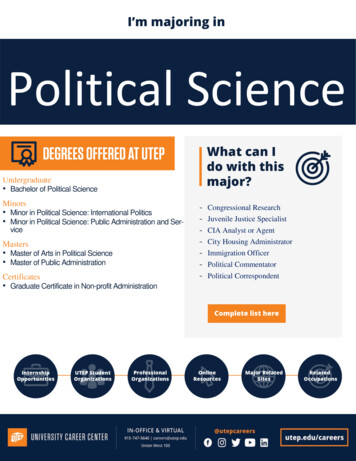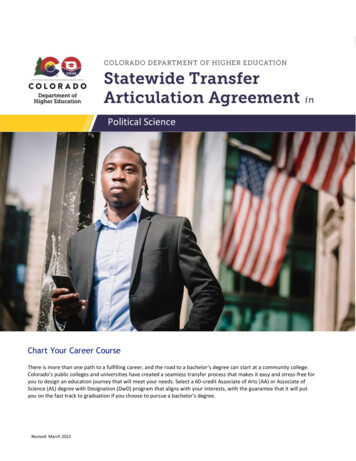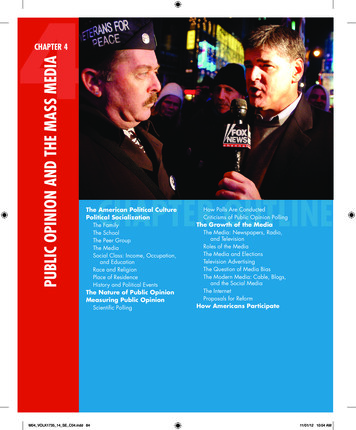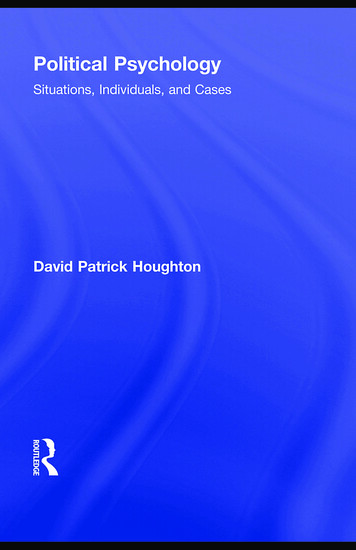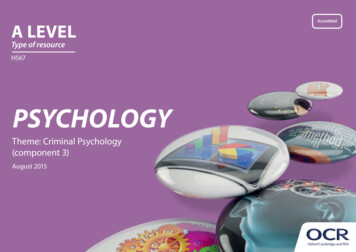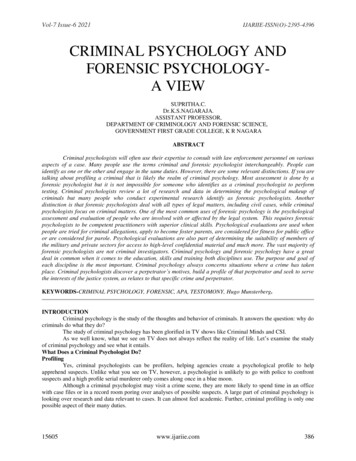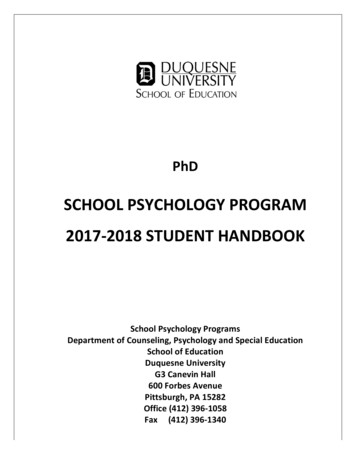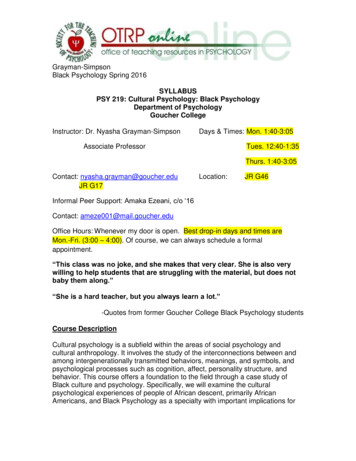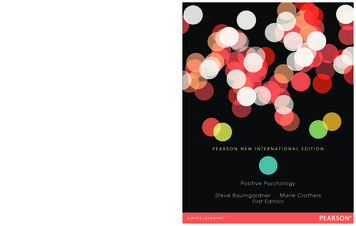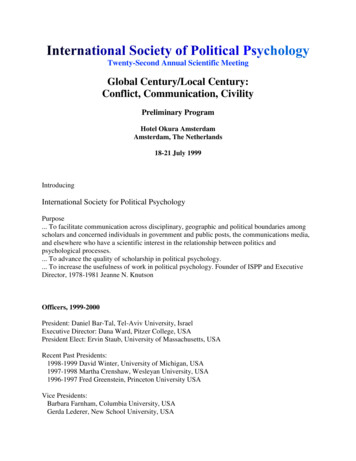
Transcription
International Society of Political PsychologyTwenty-Second Annual Scientific MeetingGlobal Century/Local Century:Conflict, Communication, CivilityPreliminary ProgramHotel Okura AmsterdamAmsterdam, The Netherlands18-21 July 1999IntroducingInternational Society for Political PsychologyPurpose. To facilitate communication across disciplinary, geographic and political boundaries amongscholars and concerned individuals in government and public posts, the communications media,and elsewhere who have a scientific interest in the relationship between politics andpsychological processes. To advance the quality of scholarship in political psychology. To increase the usefulness of work in political psychology. Founder of ISPP and ExecutiveDirector, 1978-1981 Jeanne N. KnutsonOfficers, 1999-2000President: Daniel Bar-Tal, Tel-Aviv University, IsraelExecutive Director: Dana Ward, Pitzer College, USAPresident Elect: Ervin Staub, University of Massachusetts, USARecent Past Presidents:1998-1999 David Winter, University of Michigan, USA1997-1998 Martha Crenshaw, Wesleyan University, USA1996-1997 Fred Greenstein, Princeton University USAVice Presidents:Barbara Farnham, Columbia University, USAGerda Lederer, New School University, USA
James Sidanius, University of California at Los Angeles, USAPeter Suedfeld, University of British Columbia, CanadaEditors of Political Psychology:Eugene Borgida, Wendy Rahn, John Sullivan, University of Minnesota, USABook Reviews: Doris Graber, University of Illinois, Chicago, USAEditors of ISPPNews: Juliet Kaarbo, Ryan Beasley, University of Kansas, USATreasurer: Alan Whittaker, Springfield, Virginia, USACouncillor: Margaret G. Hermann, Syracuse University, USAConference Director: Matin Hakemi, University of British Columbia, CanadaISPP Governing CouncilStarting a second year in 1999:Aaron Belkin, University of California at Santa Barbara, USAChrist'l de Landtsheer, University of Amsterdam, The NetherlandsStanley Feldman, State University of New York, Stony Brook, USARichard Ned Lebow, The Ohio State University, USAKristen Monroe, University of California at Irvine, USAAdam Niemczynski, Jagiellonian University, PolandKoichi E. Okamoto, Toyo Eiwa Women's University, JapanEric Stern, University of Stockholm, SwedenStarting a first year in 1999:C. Fred Alfred, University of Maryland, USAFrancis Beer, University of Colorado, USAJohn Cash, University of Melbourne, AustraliaAubrey Immelman, St. John's University, USACatarina Kinnvall, Lund University, SwedenBert Klandermans, Free University, The NetherlandsSam McFarland, Western Kentucky University, USAHelen Shestopal, Moscow State University, RussiaEx officio from previous service:Cynthia Chataway, York University, CanadaAnn Crigler, University of Southern California, USAMichael Delli Carpini, Barnard College, Columbia University, USAJohn Duckitt, University of Auckland-Tamaki Campus, New ZealandElizabeth Lira Kornfield, Latin American Institute of Mental Health, ChileKathleen McGraw, The Ohio State University, USAWendy Rahn, University of Minnesota, USAMeredith Watts, University of Wisconsin-Milwaukee, USAVice-Presidents, Ex officio from previous service:
Helen Haste, University of Bath, EnglandSteve Walker, Arizona State University, USAAward Committee ChairsLasswell Award for Distinguished Scientific Contributions:Leonie Huddy, State University of New York at Stoney Brook, USASanford Award for Distinguished Professional Contributions:Cynthia Chataway, York University, CanadaErikson Award for Early Career Research Achievements:Kathleen McGraw, The Ohio State University, USAAlfred Freedman Award for Best Scientific Paper at Annual Meeting:Helen Haste, University of Bath, EnglandWelcome from . . .President David WinterWelcome to Amsterdam and the 22nd Annual Scientific Meeting of ISPP! We are meeting at theend of an extraordinary century. Over the past hundred years the forces of globalism andlocalism have created an unprecedented dialectic of communication and conflict, highlighting theneed for civility.It is appropriate that we are meeting in the Netherlands. Centuries ago, the Dutch played animportant role in the globalization of capitalism. One hundred years ago, the first InternationalPeace Conference was held in The Hague. More recently, the Dutch have fosteredinternationalism and communication across borders. The Netherlands is also a place wherepeople of diverse and deeply-rooted local loyalties live in civility, tolerance, and civicconsciousness.I invite you to join in our scientific program as we reflect on these themes from the uniqueinterdisciplinary perspective of political psychology. At the same time, I hope you will take timeto appreciate the very special arts, architecture, and atmosphere of our host city, Amsterdam.Welcome!Conference Co-Chair Christ'l de Landtsheer and Bert KlandermansFor the second time, ISPP is holding its annual meeting in Amsterdam. Those of you whoattended the first Amsterdam meeting will find the city as exciting and permissive as ever. If youare in Amsterdam for the first time, give yourself time to explore the town. Settle down on aterrace at the Leidseplein. Take the canal-tour; that will give you the best view of themonumental houses. Take a streetcar from east to west and you will travel through a wide varietyof cultures.Amsterdam, like any big city, is a melting pot of cultures and lifestyles, and it is worthexperiencing some of it. For those who don't want to take time off, we have added interesting
bits of Amsterdam and the Netherlands to the program: the struggle against the water, Dutchpolicy on refugees, drugs, prostitution, and euthanasia. On the light side, we are proud to havebeen able to secure the Amsterdam Historical Museum for the reception. This will be anopportunity to learn about the city's past, and we hope to see you there. The local organizingcommittee wishes you a fruitful and productive meeting.Conference Director Mat HakemiOn behalf of the entire conference staff, I would like to welcome you to Amsterdam and thankyou for participating in our 22nd Annual Meeting. I would like to take this opportunity and givea special thanks to Christ'l de Landtsheer, Bert Klandermans, Sam McFarland, Dana Ward, andDavid Winter for their efforts in putting together an exceptional program of panels and events. Itwas a pleasure to work with everyone this year and feel the enthusiasm and energy that helpedput this conference together. Christ'l and Bert have done a terrific job with events in the socialprogram and I hope that you will get the opportunity to attend most of them. Please recognizeJudy and Susan Franzblau from Global Events, our professional meeting planner for Amsterdam.Judy will be at the registration desk for the duration of the conference; feel free to ask her thewhereabouts of ISPP officers at the meeting. I am sure that you will find plenty to do inAmsterdam but if you have any problems, or need suggestions for restaurants or entertainment inAmsterdam, please see Christ'l, Judy or myself. Also, keep in mind our future ISPP conferencedestinations:2000: Seattle, USA July 1-52001: Cuernavaca, Mexico TBA2002: Berlin, Germany (tentative) TBAThese are all spectacular destinations and I hope to see you there!Program Chair Sam McFarlandWith more than 500 participants representing about 40 countries, the 22nd Annual ScientificMeeting is perhaps ISPP's largest. Likewise, the range of topics is broad, and participants willfind many intellectually enriching panels and presentations.Two assistants at Western Kentucky University merit special gratitude. Suzanne Forman handledmuch of the correspondence and helped bring many panels to completion. Meanwhile, Mary AnnWoosley prepared a preliminary file of the panels and presentations, maintained records, anddouble-checked virtually everything along the way.ISPP colleagues Shana Levin, Christine Pappas, Karen Stenner, and Allen Wilcox read an earlydraft of the program to identify scheduling problems. Their willingness to help should mean thatthose who want to attend several sessions on the same topic will experience fewer conflicts.Christ'l de Landtsheer, Bert Klandermans, Mat Hakemi, David Winter, Dana Ward, and HeatherGillespie all provided seamless cooperation and support.
Serving as program chair has enabled me to become acquainted with many new colleagues in thestudy of political psychology, and I am very grateful for that.Enjoy!Alfred Freedman Awardfor the best paper at the Twenty-second Annual Scientific MeetingNominations are invited for the Alfred Freedman Award given to the best paper at the 1999Annual Scientific Meeting. Program chairs are encouraged to consider the papers in their panelsand to nominate any that they believe merit consideration. Presenters may also nominate theirown papers. Send the nomination and a copy of the paper to the chair of the committee: HelenHaste, Head of Department of Psychology, University of Bath, Bath BA2 7AY, England, E-mail:h.e.haste@bath.ac.uk, TEL: 44 1225 420230, Fax: 44 1225, 482046. The committee may asknominees to supply additional copies as needed.Meeting Room Floor Plans: 1st Floor and 23rd FloorInternational Society of Political Psychology22nd Annual Scientific MeetingHotel Okura Amsterdam, Amsterdam, The NetherlandsJuly 18 to 21, 1999Final ProgramFriday, July 16, 12:30 - 5:30 p.m.Executive Committee MeetingStarlight ISaturday, July 17, 9:00 a.m. - 4:00 p.m.Governing Council MeetingStarlight ISaturday, July 17, 8:30 a.m. - NoonWorkshop I:EsperanceA New Approach to Understanding Nationalism andEthnic Conflict: Adaptive Cultural MourningCoordinator: Jeffrey Stevenson Murer, University of Illinois at ChicagoThe literature on nationalism has long been dominated by two diametricallyopposed approaches: essentialism and instrumentalism. While both have rich
explanatory power, neither offers a course of conflict amelioration. Theapproach presented in this workshop offers a dialectical synthesis of the twodominant schools, overcoming the common privileging of time -- that ethnicconflicts are either exclusively rooted in the past or in the present, andovercoming the common privileging of collective action -- that ethnicconflictsare either purely emotional responses or rational action. In order toachievethis Hegelian Aufhebung, it is necessary to synthesize two theoreticalapproaches: critical theory and psychoanalysis. This workshop offers athree-step method to deconstructing ethnic conflict, provides the requisitevocabulary to understand the interplay between critical theory andpsychoanalytictheory on a collective level, and introduces courses for conflictameliorationand resolution. Participants will be introduced to methods for initiatingdialogue between conflicting parties and evaluating the prospects forculturalhealing.Workshop participants registered in advance will be invited to submit workingpapers on nationalism and ethnic conflict which will be examined anddiscussedduring the workshop. Selected papers will then be compiled into an editedvolume.Workshop II:Meerman IA Psychodiagnostic Approach to Assessing PoliticalPersonality and Predicting Leadership PerformanceCoordinators: Aubrey Immelman, Saint Johns UniversityBlema Steinberg, McGill UniversityAfter a brief review of the major approaches to political personalityassessment,we will demonstrate our method of coding psychodiagnostic data extracted frompublicly available information and constructing personality profilescompatiblewith conventional psychodiagnostic procedures of personality assessment. Ourapproach is informed by the conceptual model of Theodore Millon, which offersanempirically validated taxonomy of adaptive personality patterns and theirmaladaptive variants, congruent with the syndromes described on Axis II ofDSM-IV.Workshop participants will receive an inventory of diagnostic criteria, amanualwith scoring instructions and interpretive guidelines, practical examples ofassessment protocols, and hands-on instruction in administering theinventory.We will also provide guidelines for reconceptualizing the assessment resultsinterms of the five-factor model of personality, Dean Keith Simonton's fivedimensions of presidential style, and James David Barber's fourfold typologyofpresidential character.
Workshop III:Meerman IIDecisionsUsing Experimental Exercises and Experiments to BetterUnderstand How People Make Political Judgments andCoordinator: Helen E. Purkitt, U.S. Naval AcademyThis workshop examines how experimental exercises and experiments can be usedtobetter understand how people make political judgments and decisions.Attendeeswill participate in three exercises and then compare these results withrelevantpast findings. These exercises include: a framing exercise based on prospecttheory, a political judgment experiment entitled "Beauty and the Politician,"anda small group experiment that requires participants to make recommendationsabouthow to spend a budget surplus in a mythical, modern nation-state. Thisexperiment replicates one conducted in the 1980's. Each of these framingexercises will serve as a point of departure for discussions of how differenttypes of experimental exercises can be used to learn more about how peoplethinkabout and make decisions about politics. Participants will receive thematerialsnecessary to use these exercises for their own teaching or research purposes.Saturday, July 17, 1:00 p.m.- 6:00 p.m.Preconference tour:Guided bus tour of Waterstate (a still-existing 13th century form of Dutchdemocracy)and the historic city of Edam. Maximum attendance: 69.Fee: 20.Sunday, July 18, 8:00 a.m. - 4:00 p.m.Conference RegistrationOkura Foyer, 1st FloorBook Exhibit and Paper SaleWitte LeeuwSunday, July 18, 8:30 - 10:15 a.m.
Panel 1.1EsperanceMetaphors and Politics I: Metaphors, Politics, and LeadersChair: Franke Wilmer, Montana State UniversityMetaphorical Meaning and PowerFrancis A. Beer, University of ColoradoChrist'l de Landtsheer, Amsterdam School of Communications ResearchGender Metaphors in Nicaragua: The Virgin Mary and the Fighting CockMaureen Dolan, Western Oregon UniversityPopular Metaphors for Some Presidents of the United StatesHerbert Barry III, University of PittsburghMetaphors of U.S. Global Leadership: Psychological Dynamics of MetaphoricalThinking during the Carter YearsJerel Rosati, University of South CarolinaSteven Campbell, University of South CarolinaDiscussant: Ofer Feldman, Naruto University of EducationPanel 1.2OtterApproaches to Authoritarianism after the Cold WarChair: Jos Meloen, University of Leiden, The NetherlandsAuthoritarianism, Social Dominance, and Helping BehaviorMark I. Walter, University of MaineWilliam F. Stone, University of MaineA Biographical Approach to the Authoritarian PersonalityAngela Kindervater, University of Hamburg, GermanyUnskilled Blue Collar Workers: Bourgeois and/or Authoritarian?Hans de Witte, University of Leuven, BelgiumAuthoritarianism and Postmodernization: A Reanalysis and ReinterpretationofIglehart's World Values Study in 43 CountriesJos Meloen, University of Leiden, The NetherlandsDiscussant:Panel 1.3Meerman IChair:Gerda Lederer, New School UniversityMobilizing to Improve the Status of Women: CulturalVariationsRoberta Sigel, Rutgers UniversityThe Impact of Development Projects on the Lives and Work of Poor Womenin IndiaLucy Creevey, University of ConnecticutGender and Nationalism in Liberalizing IndiaLeela Fernandes, Rutgers UniversityWomen in East Germany -- The Universe of Everyday LifeEva Schulze, Berliner Institut fur SozialforschungHeidemarie Stuhler, Berliner Institut für SozialforschungDiscussant: Liesbet van Zoonen, University of Amsterdam, NetherlandsPanel 1.4Investigating Race and Racism: The Intersection of Identity
Starlight IIand MethodologyChair: James S. Jackson, University of MichiganThe Structure of Korean Ethnicity in Japan: Institutional Constraints andIndividual ChoicesKojiro Nakahara, University of MichiganTiffany Lightbourn, University of MichiganJames S. Jackson, University of MichiganBeom J. Kim, University of MichiganNatayai Solomon, University of MichiganDeconstructing Self-Reported Racism in Western Europe: Prospects,Paradoxes,and ProblemsMischa E. Thompson, University of MichiganTony N. Brown, University of MichiganKojiro Nakahara, University of MichiganAntonio Brown, University of MichiganBryant Marks, University of MichiganIdentity in Diaspora: Black Identities in the United States and theNetherlandsAntonio Brown, University of MichiganMischa Thompson, University of MichiganRosa L. Thomas, University of MichiganJames S. Jackson, University of MichiganIf You don't Know, Is it Gender?: Examining Women's Responses toAnti-Racism QuestionsRosa L. Thomas, University of MichiganTony N. Brown, University of MichiganNiki T. Dickerson, University of MichiganKendrick T. Brown, Macalester CollegeDiscussant: James M. Jones, University of DelawarePanel 1.5SperwerChair:Studies of Mass Media Portrayals IJaap van Ginneken, University of AmsterdamHow Television News Influences Attitudes about Crime and Race Among theViewing Public: Evidence from the Los Angeles Media MarketFranklin D. Gilliam, Jr., University of California, Los AngelesChristopher Tarman, University of California, Los AngelesAcquiescence and Threat in World Press Perceptions of DictatorsWilliam R. Meyers, University of CincinnatiChristine A. Gerety, University of CincinnatiMedia Priming, Perceptions, and Political Atmosphere of Public Sphere:The Public Framing Theory and Discovery of Mass Behaviors from Principlesof Natural SciencesJi-Young Kim, The Ohio State UniversityCitizens and Electoral World Wide Web Sites: Patterns of Information UseMontague Kern, Rutgers UniversityMarion Just, Wellesley CollegeAnn Crigler, University of Southern CaliforniaIris (Hong) Xie, University of Wisconsin-Milwaukee
Discussant: Jaap van Ginneken, University of AmsterdamPanel 1.6Participation in Political Problem-Solving: EnhancingOtterInvolvement and ImpactChair: Cynthia Chataway, York UniversityObstacles Facing Interactive Conflict Resolution WorkshopsRanda M. Slim, Slim & AssociatesTrust-Building in Intergroup ConflictEileen F. Babbitt, Tufts UniversityMusical Chairs: Selecting participants in Unofficial Dialogue ProcessesJoyce Neu, The Carter CenterThe Importance of Involving the Silent MajorityCynthia Chataway, York UniversityDiscussant: Shana Levin, Claremont McKenna CollegePanel 1.7Starlight IChair:Political Socialization and Mobilization IMarkus Kemmelmeier, University of MichiganObservational Learning and the Formation of Foreign Policy PreferencesBen Goldsmith, University of MichiganYouth Voluntary Association Participation and Political Attitudes: A QuasiExperimental Causal AnalysisElizabeth S. Smith, Furman UniversityFolk Sociology: A Developmental, Theory-Theory Perspective for PoliticalCognitionRam Mahalingham, University of MichiganGoing beyond Dichotomies like Liberalism vs. Communitarianism: APsychologicalStudyAdam Niemczynski, Jagiellonian UniversityDiscussant:Tom Bryder, University of CopenhagenSunday, July 18, 10:30 a.m. - 12:15 p.m.Panel 2.1EsperanceMetaphors and Politics II: Metaphors and Political DiscourseChair: Maureen Dolan, Western Oregon UniversityThe Metaphor of Conversation: Implications of Transporting a PrivateConversationMode into Public Deliberative ProcessesMari Boor Tonn, University of New HampshireThe African Renaissance: Metaphor and the Deictic Foundations of IdeologyWilliam J. Botha, Randse Afrikaanse Universiteit, Johannesburg
Medicine as Metaphor: Indigenous Philosophies of PowerFranke Wilmer, Montana State UniversityDiscussant: Jerel Rosati, University of South CarolinaPanel 2.2OtterPolitical Behavior in Modern RussiaChair: Elena B. Labkovskaya, St. Petersburg State UniversityPsychological Peculiarities of Political Communications in Modern RussiaTatiana V. Anisimova, St. Petersburg State UniversityPsychological Phenomenon of Students' Political Activity in Modern RussiaNinel Y. Olesich, St. Petersburg State UniversityVoting Behavior in Modern Russia: Case of Spb Elections, December 1988Elena B. Labkovskaya, St. Petersburg State UniversityPeculiarities of Inner Conflict in Russians' Economic-PoliticalConsciousnessOlga S. Deineka, St. Petersburg State UniversityActual Psychological-Political Problems in Modern RussiaAlexander Yuriev, St. Petersburg State UniversityDiscussant:Panel 2.3NetherlandsMeerman ILinda O. Valenty, San Jose State UniversityEuthanasia and Physician-assisted Death in theChair: Paul J. van der Maas, Erasmus University, RotterdamAn Overview of 25 Years of Euthanasia Debate in the NetherlandsR.J.M. Dillmann, KNMG (Royal Dutch Medical Association)Decisions Concerning the End of Life in Medical Practice in the NetherlandsGerrit van der Wal, Erasmus University RotterdamPaul J. van der Maas, Erasmus University, RotterdamDick L. Willems, Vrije Universiteit, Amsterdam (Alternate)Bregje D. Onwuteaka-Philipsen, Vrije Universiteit, Amsterdam(Alternate)Legal Aspects of Physician-assisted Death in the NetherlandsJ. Legemaate, Erasmus University, RotterdamH.J.J. Leenen, (Alternate)Regulation, Examination, and Quality Assurance of Physician-assisted DeathBregje D. Onwuteaka-Philipsen, Vrije Universiteit, AmsterdamGerrit van der Wal, Vrije Universiteit, Amsterdam (Alternate)Changes in Dutch Opinions on Euthanasia, 1966 through 1996Johanna H. Groenewoud, Erasmus University, RotterdamFuture PerspectivesH.J.J. LeenenPanel 2.4Meerman IIProfiling and Profiles of Political LeadersChair: Graham Little, University of MelbourneThe Political Personality of 2000 Presidential Candidate George W. BushAubrey Immelman, Saint John's University
The Great Divider: Personality, Vice-Presidential Leadership, and Spiro T.AgnewScott W. Webster, University of MarylandThe Personality and Politics of New Zealand Prime Minister David LangeJohn Henderson, University of CanterburyJohn F. Kennedy as Dramatic LeaderRobert Gilbert, Northeastern UniversityDiscussant: Jacques Szaluta, United States Merchant Marine AcademyPanel 2.5SperwerChair:Studies of Mass Media Portrayals IIAlan J. Lipman, Georgetown UniversityPersonalization in Political Television News: An Analysis of the Content ofTexts and Visuals and a 13-Wave Survey StudyJan Kleinnijenhuis, Vrije UniversiteitDirk Oegema, Vrije UniversiteitDictators in Power Versus Other World Leaders: A Comparison of WorldPress PortrayalsWilliam R. Meyers, University of CincinnatiChristine A. Gerety, University of CincinnatiJames L. Szalma, University of CincinnatiFraming the Outsider: Media Treatment of the Jesse Jackson CandidicesMatthew Kerbel, Villanova UniversityMarc Howard Ross, Bryn Mawr CollegeThe Arab-Israeli Conflict in the French and Dutch PressNathalie Yahouni-HuttenDiscussant: Ernst L. Moerk, California State University at FresnoPanel 2.6Starlight IIChair:Globalization and Cultural IdentityKaren Walch, The American Graduate School of International ManagementA Brave New Globe?Moshe Hazani, Bar Ilan UniversityCultural Identity in a Global NeighborhoodWalter B. Simon, University of ViennaThe Self in Society and Society in Self: Some Insights from IsraeliJewish-Arab EncountersShifra Sagy, Ben Gurion University of the NegevShoshana Steinberg, Ben Gurion University of the NegevMueen Fakhireldeen, Ben Gurion University of the NegevThe Global Economy and the Subversion of Indigenous Local CulturesLeonard Suransky, University of Durban-WestvilleDiscussant: Karen Walch, The American Graduate School of InternationalManagementPanel 2.7Starlight IPolitical Socialization and Mobilization IIChair: James H. Kuklinski, University of Illinois
Content Matters: Differential Socialization Effects in VoluntaryAssociationsMarc Hooghe, Vrije Universiteit BrusselsEnglish Only Activism in the United States: Initial Findings on PerceptualDimensionsGuy F. Shroyer, University of PittsburghCecilia Castillo Ayometzi, Georgetown UniversitySocial Control and Collective Action: Informal Control Mechanisms in SocialParticipationMaría J. Funes, UNEDDiscussant: Helen Haste, University of BathSunday, July 18, 12:15 - 2:00 p.m.Invited Address 1Heian12:15 - 1:00 p.m.The Hollowed-Out Citizen: Political Argument and Public JudgmentPaul M. Sniderman, Stanford UniversityInvited Address 2Heian1:00 - 2:00 p.m.Asylum and Refugee Policy in The NetherlandsAad Kosto, former Assistant Secretary of State of The Netherlands forRefugees,Immigration, and Justice and Member of Dutch State CouncilSunday, July 18, 2:15 - 4:00 p.m.Panel 3.1EsperanceMetaphors and Politics III: Metaphors, Political Culture, andPolitical IdentityChair: Mari Boor Tonn, University of New HampshirePolitical Metaphors in JapanOfer Feldman, Naruto University of EducationFrom Praise to Criticism: Metaphors in African Political RhetoricSamuel Gyasi Obeng, Indiana UniversityHistorical Metaphor and the Search for Russian IdentityMarilyn J. Young, Florida State University"Orientalism": the Ideology behind the Metaphorical Gulf WarEsra Sandikcioglu, Gerhard Mercator Universität GH DuisburgMetaphors of the DeafFranz Dotter, University of KlagenfurtDiscussant: Richard D. Anderson, Jr., University of California, Los AngelesPanel 3.2Studies of Political Leadership
OtterChair: Piero Rocchini, I.S.P.A.Leaders of the Middle WayGraham Little, University of MelbourneThe Politics of Rejuvenation: The Case of President Sukarno in the GuidedDemocracy YearsAngus McIntyre, La Trobe UniversityParty Leaders, Leadership Schemas and the Canadian ElectorateAndre Turcotte, McMaster UniversitySelecting the Politician of the YearMarten Brouwer, PoulfougouDiscussant: Piero Rocchini, Superior Institute of Applied PsychologyPanel 3.3Meerman IInnovations in Theorizing and Measuring Social IdentityChair: Alyssa N. Zucker, University of MichiganMulti-Racial Identity and the Social Construction of RaceLauren E. Duncan, Smith CollegeJennifer M. Ventura, Smith CollegeUnder Pressure: Black Students' Experience on a Predominantly White CampusElizabeth R. Cole, Northeastern UniversityDebra Ford, Northeastern UniversityStanding on a Ladder: A New Measure of Subjective Social ClassJoan M. Ostrove, University of California, San FranciscoNancy E. Adler, University of California, San FranciscoMiriam Kuppermann, University of California, San FranciscoI'm not a Feminist, but.: Innovations in Measuring Feminist IdentityAlyssa N. Zucker, University of MichiganDiscussant: Abigail J. Stewart, University of MichiganPanel 3.4Meerman IIChair:Political Dimensions and Dynamics in YugoslaviaWillem E. Saris, University of AmsterdamThe Relationship between Right and Left Wing Authoritarian in YugoslaviaNebojsa Petrovic, Institute za PsihologijuThe Political Parties and Right and Left Wing AuthoritarianismNebojsa Petrovic, Institute za PsihologijuStructure of Social Attitudes in Yugoslavia: Test of Eysenck's TwodimensionalModelAleksandar Vasic, University of Novi SadAleksandra Trogrlic, University of Novi SadVesna Zunac, University of Novi SadBojan Todosijevic, University of Novi SadEuropean Identity of Yugoslav Students and Individualism/Collectivism asitsDeterminant
Nebojsa Majstorovic, University of Novi SadMirjana Francesko, University of Novi SadJasmina Kodzopeljic, University of Novi SadDiscussant:Panel 3.5SperwerFranke Wilmer, Montana State UniversityStudies of Ethnocentrism, Stereotyping, and Prejudice IEffects on Voting and Policy PreferencesChair: Joseph F. Pentony, University of St. ThomasRace, Ideology and Party Voting Realignment in the 1990'sDavid Sears, University of California at Los AngelesNicholas A. Valentino, University of MichiganPolitical Impression Management: A Dutch Case Study: Appearance of Malesand the Perception of Political SuitabilityChrist'l de Landtsheer, Amsterdam School of Communications ResearchClaudius Wolff, Amsterdam School of Communications ResearchSandra de Jonge, Amsterdam School of Communications ResearchSebastiaan Berkvens, Amsterdam School of Communications ResearchGroup Stereotypes in Electoral PoliticsEwa Golebiowska, Tufts UniversityWhiteness: Can a Transparent Racial Identity Affect Policy Preferences?James A. McBryar, University of HartfordPolitical Impression Management: A Dutch Case-Study: Appearance of Femalesand the Perception of Political SuitabilityChrist'l de Landtsheer, Amsterdam School of Communications ResearchDanielle van den Bichelaer, Amsterdam School of CommunicationsResearchPatty de Nieuwe, Amsterdam School of Communications ResearchRene Ponsen, Amsterdam School of Communications ResearchPanel 3.6Starlight IIYouths in Politically Difficult SituationsChair: Liesbet van Zoonen, University of Amsterdam, NetherlandsRecall Schemas and Memory Distortions about the Military Coup in Chile: TheCase of Children and Young PeopleAndres A. Haye, Pontificia Universidad Catolica de ChileJorge Manzi, Pontificia Universidad Catolica de ChileJaime Castillo, Johns Hopkins UniversityIndividualism and Collectivism in Two Conflicted Societies: ComparingIsraeli-Jewand Palestinian-Arab High-school StudentsShifra Sagy, Ben Gurion University of the NegevEmda Orr, Ben Gurion University of the NegevDan Bar-On, Ben Gurion University of the NegevValues of Israeli and Palestinian StudentsDov Elizur, Bar-Ilan UniversityJeffrey Kantor, Bar-Ilan UniversityAbraham Sagie, Bar-Ilan UniversitySocial Networks of Displaced Families Due to Political Violence in Colombiaand the Post-traumatic Stress Symptoms Suffered by the Younger Membersof the FamilyJorge Palacio, Université Paris X-NanterreColette Sabatier, Université Paris X-Nanterre
Discussant:Panel 3.7EducationalStarlight IAdam Niemczynski, Jagiellonian UniversityThe International Association for the Evaluation ofAchievement Civic Education Study: Disciplinary PerspectivesChair: Judith Torney-Purta, University of MarylandAn Overview of the Two-Phased IEA Project Underway in Twenty-eightCountriesJudith Torney-Purta, University of Mary
Executive Director: Dana Ward, Pitzer College, USA President Elect: Ervin Staub, University of Massachusetts, USA Recent Past Presidents: 1998-1999 David Winter, University of Michigan, USA 1997-1998 Martha Crenshaw, Wesleyan University, USA 1996-1997 Fred Greenstein, Princeton University USA Vice Presidents:
